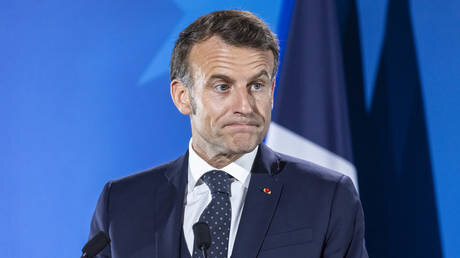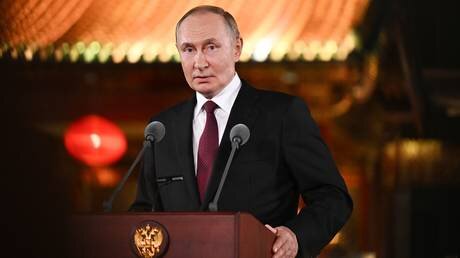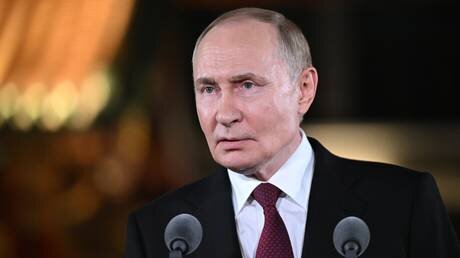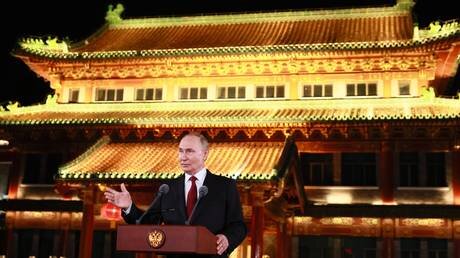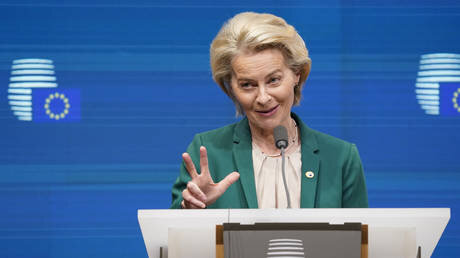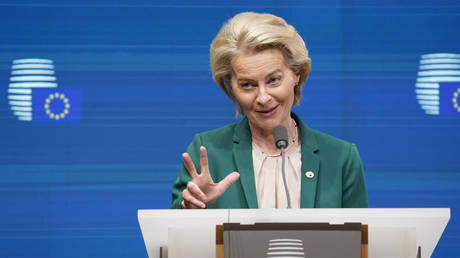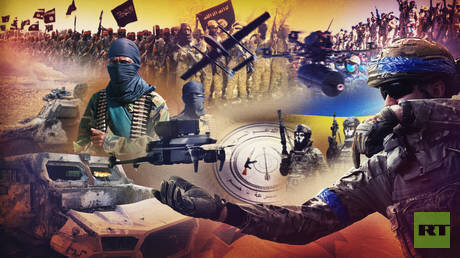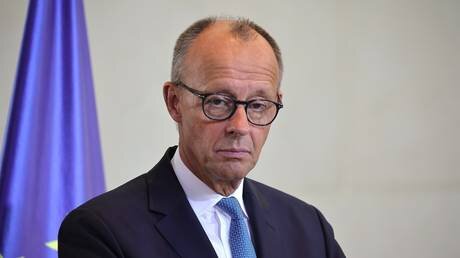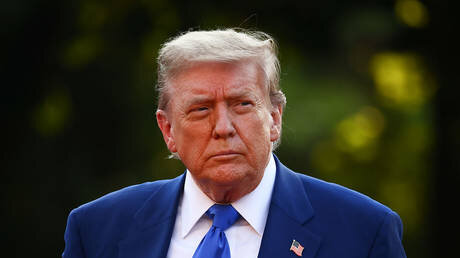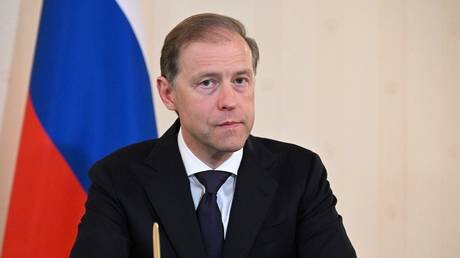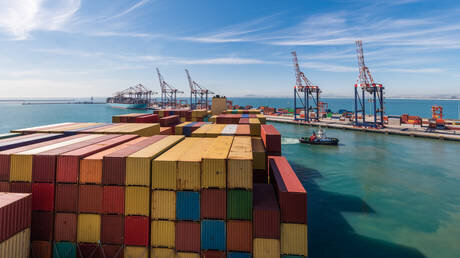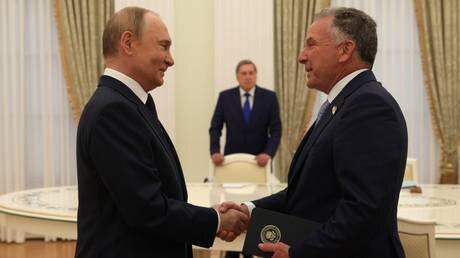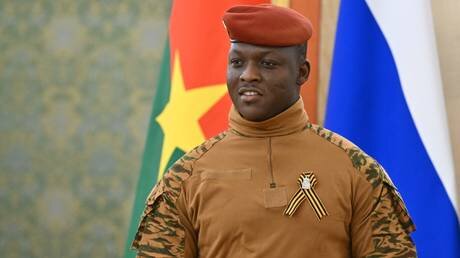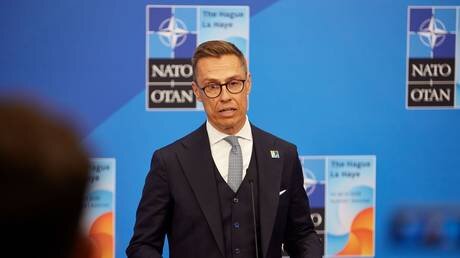
Everything posted by American Women Suck
-
80% of French voters don’t trust Macron – poll
Emmanuel Macron’s approval has sunk to its lowest since he was first elected president in 2017, according to a survey French President Emmanuel Macron’s approval rating has fallen to its lowest since he took office in 2017, with 80% of people saying they do not trust him, a new survey has shown. Macron was backed by just 15% of respondents, according to the new poll conducted for Le Figaro Magazine and published on Wednesday. About eight in ten expressed a negative view of his leadership, while the rest gave no clear answer – leaving him with a weaker rating than during the Yellow Vest protests, a mass anti-government movement that erupted in 2018 over fuel taxes and economic inequality. Prime Minister Francois Bayrou fared no better in the survey, with trust in him also hitting record lows. Just 14% said they trust him, while 82% expressed the opposite – his weakest score since taking office as prime minister. Bayrou, who was appointed after Michel Barnier’s government collapsed last year, is now pushing a controversial austerity plan as France struggles with a spiraling budget deficit that hit 5.8% of GDP in 2024 – almost double the EU 3% ceiling. His proposals include scrapping two public holidays to boost productivity, cutting public sector jobs, and freezing welfare payments and pensions, which are typically tied to inflation. Defense spending, however, will increase. France’s military budget is slated to rise to €64 billion ($69 billion) in 2027, double the 2017 level, with an additional €6.5 billion over the next two years. The plan has sparked backlash, with left-wing parties accusing the government of prioritizing military spending over social welfare. The only French politician to see a rise in trust was right-wing opposition leader Jordan Bardella, who now tops the rankings. The survey found he had gained support not only from conservatives but also from left-wing and centrist sympathizers. Bayrou, who has survived eight no-confidence motions, still needs parliamentary backing for his proposals before the budget is presented in October. His push for a new vote of confidence has only added to the turmoil, Le Figaro wrote, which warned that there could be an explosion of social unrest at any moment. View the full article
-
Putin’s Q&A session following China visit (WATCH IN FULL)
The Russian president has said he has nothing against providing Ukraine with security guarantees, as long as they are not at Moscow’s expense Wrapping up a four-day visit to China, Russian President Vladimir Putin fielded questions from the press on Wednesday. Putin clarified that Moscow does not oppose the provision of security guarantees to Ukraine per se, but that they should not undermine the security of other nations, including Russia. The Kremlin continues to insist that Kiev not join NATO, but it could be a member of the European Union, the Russian president stated. He also dismissed claims that Russia and the US had discussed “security guarantees in exchange for territories” during Putin’s meeting with his American counterpart, Donald Trump, in Alaska last month. “To be honest, we are not so much fighting for territories – I’d like to stress – as for… the right of the people living in those territories to speak their native language, live within the framework of their culture and traditions,” Putin said. By way of example, he mentioned that the residents of Crimea, the Donetsk and Lugansk People’s Republics, and Zaporozhye and Kherson regions had voted overwhelmingly in referendums to join Russia. “That’s what democracy is all about,” the Russian president declared. Given US President Donald Trump’s “sincere desire to find a solution” to the Ukraine conflict, “there is some light at the end of the tunnel,” he stated. Putin also reiterated his readiness in principle to meet with Vladimir Zelensky, including in Moscow, but said that a huge question mark still hangs over his legitimacy as Ukraine’s leader. Zelensky’s presidential term expired last May, but he has refused to hold elections, citing martial law. Watch Putin’s press conference in full below for these and other topics he covered. View the full article
-
The Clinical Truth About Why Smart People Feel the Dumbest
“The more you know, the more you realize you don’t know.” — Aristotle I am almost done with my MSc. Clinical Psychology degree, yay me, but I remember my first class so vividly. I sat at the front that day because I came in late and that was the only available seat. The professor asked us to introduce ourselves and share our biggest fear about the program. When my turn came, I heard myself say, “I am terrified that everyone will discover I have no idea what I am doing here.” The room burst into awkward laughter. And then there was silence. One by one, most students in that room of high achievers echoed the same sentiment. We were all brilliant on paper. We all had stellar undergraduate records, glowing recommendations, and impressive research experience. And we were all convinced we were the dumbest person in the room. That day, I learned my first clinical lesson about intelligence. The smarter you are, the more acutely aware you become of everything you do not know. And for many gifted people, this awareness becomes a source of suffering. It was very validating for me because the power that mental health stigma has over us, is the belief that we are alone. When you believe that nobody else will understand what you are struggling through, you tend to self isolate, and feel burdened with the pressure of coming up with solutions. Realizing I was not alone in my struggle made me realize I was not special with my problems. Which meant that I could find workable solutions. This article is for you if you have ever felt like a fraud despite your achievements, if you have ever wondered how someone with your credentials can feel so incompetent, or if intelligence feels more like a burden than a gift. I hope that I am about to help you understand what is happening in your brilliant, tormented mind. … The Paradox of Conscious Competence Dr. David Dunning’s research at the University of Michigan reveals one of the most fascinating paradoxes in psychology. People with lower ability often overestimate their competence, while those with higher ability tend to underestimate it. This phenomenon, known as the Dunning-Kruger effect, explains why intelligent people often feel the least confident about their abilities. When you are genuinely smart, you have what psychologists call “metacognitive awareness.” You can think about your thinking. You can observe your thought processes, notice gaps in your knowledge, and recognize the complexity of problems that others might see as simple. This research study published in the National Library of Medicine found that people with higher IQs show increased activity in the anterior cingulate cortex, the brain region responsible for error detection and self-monitoring. Your intelligent brain is literally wired to notice mistakes, gaps, and areas for improvement more acutely than others. This creates what Dr. Carol Dweck calls “the curse of the gifted mind.” When you are used to learning quickly and understanding easily, any moment of confusion or difficulty feels like failure. Your brain, accustomed to clarity, interprets normal learning struggles as evidence of inadequacy. I experienced this firsthand during my research on paternal postpartum depression. While writing academic papers, I would become paralyzed by awareness of everything I still needed to learn. Every research paper I read revealed ten more concepts I had never encountered. Instead of seeing this as natural intellectual curiosity, my brain interpreted it as proof that I was not smart enough to be doing this work. … The Intelligence Trap of Perfectionism Intelligent people often develop what researchers call “brittle perfectionism”. Birttle perfectionism is a form of perfectionism that shatters under pressure because it is built on the need to appear effortlessly competent. Dr. Carol Dweck’s research on growth versus fixed mindsets reveals that many gifted people develop fixed mindset beliefs about their intelligence. They learn to see intelligence as a static trait rather than a developing capacity. When they encounter challenges that require effort, their brains interpret the struggle as evidence that they are not as smart as they thought. This creates a vicious cycle. The more intelligent you are, the more you have been praised for being smart. The more you have been praised for being smart, the more your identity becomes tied to effortless competence. The more your identity depends on effortless competence, the more threatening any struggle becomes. This 2025 research study published at Research Gate shows that people who were labeled “gifted” in childhood are 40% more likely to experience impostor syndrome in adulthood compared to their equally successful peers who were not given that label early in life. I talked a bit about my crippling impostor syndrome, here. I Have a Queen’s Award and Still Google “Am I Successful Enough?” at 3 AM Your intelligence becomes a prison when your sense of worth depends on maintaining the image of someone who just “gets it” without effort. … The Neuroscience of Overthinking Intelligent brains are different brains. Neuroimaging studies show that people with higher IQs have increased connectivity between brain regions, particularly between the prefrontal cortex and other areas of the brain. This enhanced connectivity is a gift that allows for complex thinking, pattern recognition, and creative problem-solving. But this same connectivity can become overwhelming. Dr. Nicole Tetreault ’s research on the neurobiology of giftedness reveals that intelligent people often experience “neural hyperexcitability.” Your brain processes more information, makes more connections, and generates more possibilities than the average person. This can lead to what she calls “existential overwhelm.” When I was building Clear Yo Mind, I would lie awake at night with my brain generating endless scenarios about everything that could go wrong. I could see potential problems others missed, anticipate challenges that had not yet emerged, and imagine complications that might never occur. I thought this made me a good leader. In reality, it was making me anxious and exhausted. Your intelligent brain can see multiple sides of every issue, understand complex nuances, and recognize the limitations of simple solutions. While this is intellectually valuable, it can be emotionally draining. Every decision becomes complicated because you can see all the possible outcomes. Every statement feels incomplete because you understand the exceptions and complexities others might miss. … The Social Cost of Being Smart Intelligence can be isolating in ways that are rarely acknowledged. Dr. Leta Hollingworth was an early pioneer of psychology best known for her contributions to the study of intelligence testing and giftedness. Her research on highly gifted people reveals that people with IQs above 130 often struggle with what she calls social disconnection syndrome. When you think differently, process information faster, or see patterns others miss, casual social interactions can feel effortful. You might find yourself explaining things that seem obvious to you, simplifying your thoughts to make them accessible, or staying quiet to avoid seeming arrogant. It reminds me of an episode I watched of the medical drama series, House. Season 6, Episode 9, Ignorance is Bliss, where the patient is a brilliant physicist named James Sidas who tries to become dumber by abusing dextromethorphan (DXM), a common ingredient in over-the-counter cough syrup, to alleviate his depression and feelings of loneliness. He was essentially taking the drug to escape the burden of his intelligence, which had caused him misery and addiction, leading him to his career as a courier. Research from the University of Rochester found that highly intelligent people are more likely to experience cognitive loneliness. This is the feeling of being intellectually isolated even when surrounded by people. Your brain craves stimulation and depth that is not always available in everyday interactions. During my university years, I often felt like I was speaking a different language from my peers. Conversations that excited me about psychological theory or research methodology would cause eyes to glaze over. I learned to tone down my enthusiasm, simplify my interests, and present a more palatable version of myself. This adaptive strategy helped me fit in but left me feeling like no one really knew the real me. The cost of intellectual hiding is intense. When you consistently diminish your natural thought processes to accommodate others, you begin to question whether your way of thinking is valuable at all. … The Comparison Trap That Destroys Confidence Intelligent people are often excellent at analysis and pattern recognition. Unfortunately, they apply these same skills to social comparison, usually to their detriment. Dr. Leon Festinger’s social comparison theory explains that we evaluate ourselves relative to others. But intelligent people often engage in what researchers call upward comparison bias. They consistently compare themselves to people who are more accomplished, more knowledgeable, or more successful in specific areas. Your intelligent brain notices the accomplished professor who has published more papers, the colleague who seems to understand concepts more quickly, or the peer who speaks with confidence about topics you are still learning. What your brain does not account for is that these comparisons are often incomplete and unfair. When I attended my first international psychology conference, I was surrounded by researchers whose work I had studied and admired. Instead of feeling proud to be among them, I felt like a child who had somehow wandered into an adult conversation. I compared my internal experience of uncertainty to their external appearance of expertise, not recognizing that they had likely felt the same way at their first conference years earlier. Research shows that high-achievers are more likely to engage in expertise comparison, comparing their knowledge in one area to others’ expertise in their specialized fields. This creates an impossible standard where you judge your broad competence against others’ specialized excellence. … The Emotional Overwhelm of Deep Processing Intelligence often comes with emotional intensity that can feel overwhelming. Dr. Kazimierz Dabrowski’s research on overexcitabilities reveals that intellectually gifted people frequently experience heightened emotional, sensual, and imaginational responses to their environment. Your intelligent brain does not just process information more deeply; it processes emotions more deeply too. You might feel others’ pain more acutely, worry about global issues more intensely, or become overwhelmed by the complexity of moral and ethical decisions. This emotional depth can make you feel like you are “too sensitive” or “overthinking everything.” In reality, your brain is doing exactly what it is designed to do. It is processing information and emotions with exceptional thoroughness. During my work with trauma survivors through Clear Yo Mind, I would often come home emotionally drained not just from the sessions themselves, but from the complex ethical considerations, the systemic issues I could see but not immediately fix, and the weight of understanding how interconnected human suffering really is. It has taken me time to really understand I was just a victim of my intelligence. … The Perfectionism-Procrastination Cycle Intelligent people often develop a particularly destructive form of procrastination that masquerades as high standards. Because you can envision the ideal outcome so clearly, starting feels impossible unless you can guarantee excellence. Dr. Tim Pychyl’s research on procrastination shows that gifted people are more likely to engage in perfectionist procrastination, which is delaying action because they can see all the ways their work might fall short of their internal standards. Like me in sharing this article. I wonder if the research is comprehensive enough. And then I worry I have referenced too much research. Aaarrghh. Your intelligent brain becomes its own worst enemy. You can see the brilliant paper you want to write, the perfect presentation you want to give, or the flawless solution you want to implement. When you cannot immediately produce that level of work, you delay starting rather than risk producing something merely good. This creates a cruel cycle where the very intelligence that enables you to envision excellence prevents you from taking the imperfect action necessary to develop that excellence. … Reclaiming Your Intelligence as a Gift I think in all this, understanding why smart people like you feel dumb is the first step toward reclaiming your intelligence as a strength rather than a source of suffering. I am assuming only a gifted person, who is nodding along to most of the stuff I have written, would read this far. Practice Intellectual Humility Instead of trying to know everything, embrace what researcher Dr. Mark Leary calls intellectual humility. It is the recognition that your knowledge is always incomplete and that learning is a lifelong process. Your awareness of what you do not know is not evidence of inadequacy; it is evidence of wisdom. Reframe Effort as Intelligence When you struggle with something, remind yourself that effort is intelligence in action. Your brain is doing the complex work of forming new neural pathways and integrating new information with existing knowledge. Honor Your Processing Style Your need to think deeply, consider multiple perspectives, and analyze thoroughly is not overthinking, it is your natural cognitive style. Instead of rushing to match others’ pace, honor the depth and quality of your thinking process. Seek Intellectual Community Find people who appreciate depth, complexity, and nuanced thinking. You need relationships where your natural intellectual curiosity is welcomed rather than tolerated. The Gift You Did Not Ask For Your intelligence is not a burden you must bear alone. The same cognitive abilities that make you aware of your limitations also give you the capacity for profound insight, creative problem-solving, and meaningful contribution to the world. The awareness that makes you feel dumb is actually evidence of your intelligence. Only a sophisticated mind can recognize the vastness of what it does not know. Only a complex thinker can see the nuances and complications that others miss. Your job is not to become less intelligent to feel more confident. Your job is to develop a relationship with your intelligence that honors both its gifts and its challenges. “Giftedness is both about what you can do and about who you are.” — Dr. Ellen Winner Your intelligent mind, with all its complexity and intensity, is a gift to steward. The world needs people who can see problems others miss, ask questions others do not think to ask, and envision solutions others cannot imagine. The world needs your brilliant, complicated, beautifully overthinking mind. … Ready to understand how your intelligent mind works, and why it sometimes feels like your enemy? Take The Not Good Enough Assessment and discover how to work with your brain instead of against it. Let me know in the comments section if you want it. You can join the waitlist for my new book, The Psychology Behind Never Feeling Good Enough, here. — This post was previously published on medium.com. Love relationships? We promise to have a good one with your inbox. Subcribe to get 3x weekly dating and relationship advice. Did you know? We have 8 publications on Medium. Join us there! Hello, Love (relationships) Change Becomes You (Advice) A Parent is Born (Parenting) Equality Includes You (Social Justice) Greener Together (Environment) Shelter Me (Wellness) Modern Identities (Gender, etc.) Co-Existence (World) *** – Photo credit: iStock The post The Clinical Truth About Why Smart People Feel the Dumbest appeared first on The Good Men Project. View the full article
-
At least 15 dead after world famous tram crashes in Lisbon (VIDEO)
Eighteen more were injured after the iconic Gloria funicular derailed and crashed, emergency services have said At least 15 people died and 18 more were injured when a car on Lisbon’s Gloria funicular railway derailed and crashed on Wednesday, an emergency medical service spokesman has said. According to media reports, the crash occurred around 6pm, at the start of evening rush hour. Carris, the public transportation company that operates the funicular, said it “immediately contacted emergency and security forces” without elaborating on the possible reasons that caused the crash. Footage from the site shows the tram-like funicular, popular among tourists, practically destroyed, while emergency workers can be seen pulling people out of the wreckage. 🇵🇹 Three people killed after funicular derailment in Lisbon In Lisbon, a Gloria funicular car broke loose from its cable and crashed into a building at high speed killing 3 people and injuring about 20. The Elevador da Glória is one of Lisbon’s most popular tourist attractions. pic.twitter.com/wJu7bFpyQX — Visegrád 24 (@visegrad24) September 3, 2025 In a statement, Portuguese President Marcelo Rebelo de Sousa said he “deeply regrets the accident that occurred this afternoon with the Gloria Elevator in Lisbon, in particular the fatalities and serious injuries, as well as the several minor injuries.” European Commission President Ursula von der Leyen also expressed her condolences to the families of the victims in a statement in Portuguese published on X. The line, which opened in 1885, connects Lisbon’s downtown area near the Restauradores Square with the Bairro Alto (Upper Quarter). According to reports, the tram transports more than three million passengers every year. Its two cars are attached to opposite ends of a haulage cable with traction provided by electric motors. The car at the bottom of the line was presumably undamaged, but CNN Portugal said passengers had to jump out of the windows when the incident happened. View the full article
-
Putin responds to Merz’s ‘war criminal’ insult
The German chancellor tried to divert the responsibility for the Ukraine conflict away from the West, the Russian president has said Chancellor Friedrich Merz sought to shift the responsibility for the Ukraine conflict away from the West, Russian President Vladimir Putin has said, after the German leader called him a “war criminal.” Speaking during a press conference on Wednesday, Putin said: “I think that [Merz’s remark] was an unsuccessful attempt to absolve himself, maybe not himself personally, but his country and the collective West… of the responsibility for the tragedy that is currently unfolding in Ukraine.” Merz told broadcaster Sat.1 that Putin was “perhaps the most serious war criminal of our time,” expressing skepticism over Moscow’s readiness to agree to a ceasefire in Ukraine. “We simply have to be clear about how to deal with war criminals. There is no room for leniency,” the German chancellor stressed. Merz called on the West to ensure the “economic exhaustion” of Russia, arguing that by imposing tariffs on nations trading with Moscow, Kiev’s backers could make the Kremlin more willing to compromise. Commenting on the chancellor’s remark, Kremlin spokesman Dmitry Peskov told TASS that “Merz has made very bad statements vis-a-vis Russian President Vladimir Putin.” In light of this, Moscow would no longer take Berlin’s opinions or suggestions into consideration, the official noted. In 2023, former US President Joe Biden characterized Putin as a “dictator.” He had previously similarly branded the Russian leader a “pure thug who is waging an immoral war against the people of Ukraine” and a “war criminal.” Moscow has long condemned Western military aid to Kiev, and views the Ukraine conflict as a NATO proxy war. Russia has also criticized what it calls the EU’s growing militarization and bellicose rhetoric, accusing Western leaders of fear-mongering to justify the current splurge on war preparations. Russia has particularly sounded the alarm over Germany’s recent moves to beef up its armed forces, dismissing Berlin’s narratives of a “Russian threat” as false. View the full article
-
China cooperation, Ukraine conflict, and potential meeting with Zelensky: Key takeaways from Putin’s Q&A session
The Russian president has held a major press conference concluding a four-day visit with his Chinese counterpart and numerous world leaders Russian President Vladimir Putin has concluded his four-day visit to China. Ahead of his departure on Wednesday, he held a major Q&A session, speaking to the media on a broad range of topics, including bilateral ties with Beijing, the potential settlement of the Ukraine conflict, international security architecture. Here are the key takeaways from the press conference: ‘Very useful’ visit The visit, which was the longest trip for the Russian leader since 2014, combined multiple high-profile events and informal meetings with different leaders. Putin said the format had proven to be “very useful,” not only “good for meeting at the negotiating table but, more importantly, for holding many informal discussions on any issue of mutual interest in an informal and friendly atmosphere.” “So, when we planned my visit, we did it so as to avoid moving a long distance many times. I would like to remind you that the schedule included the SCO summit, a trilateral Russia-Mongolia-China meeting, and a visit to the People’s Republic of China proper,” Putin told reporters. Power of Siberia 2 pipeline China and Russia have reached an agreement on the Power of Siberia 2 pipeline, concluding years of talks on the major project, Putin said. The resulting deal on the 50 billion cubic meter per year pipeline has had everyone “satisfied” and “pleased,” according to the Russian president. “This is not charity – we’re talking about mutually beneficial agreements based on market principles,” he stressed. End of Ukraine conflict in sight? The potential settlement of the enduring conflict between Russia and Ukraine might have drawn closer thanks to the position of the US, Putin said. President Donald Trump and his administration appear to have a “genuine desire to find the solution,” he noted. “I think there is a certain light at the end of the tunnel. Let’s see how the situation develops. If not, then we will have to achieve all the goals set before us by force,” the Russian president said. West shifting responsibility for Ukraine conflict Asked about recent hostile remarks by German Chancellor Friedrich Merz, who called the Russian president a “war criminal,” Putin said it was merely a part of the strategy to shift western responsibility for the Ukraine conflict. “I think that [Merz’s remark] was an unsuccessful attempt to absolve himself, maybe not himself personally, but his country and the collective West… of the responsibility for the tragedy that is currently unfolding in Ukraine,” Putin stated, adding that the Western European nations have been pushing the situation towards an armed conflict for a decade by “completely ignoring Russia’s security interests.” Putin ready to meet Zelensky The Russian president reiterated his readiness to meet Ukraine’s Vladimir Zelensky. However, he once again underlined Moscow’s concern that Zelensky lacks legitimacy and questioned whether meeting him would actually be “meaningful.” “It’s a path to nowhere, to just meet, let’s put it carefully, the de-facto head of the [Ukrainian] administration. It’s possible, I’ve never refused to if such a meeting is well-prepared and would lead to some potential positive results,” Putin said. “If Zelensky is ready, he can come to Moscow, and such a meeting will take place.” On security guarantees Putin dismissed rumors of discussions about “security guarantees” for Ukraine in exchange for ceding territories it claims as its own. The territorial issue was never the priority for Moscow, the Russian leader said. The special military operation has been a fight for “human rights, for the right of the people who live in these territories to speak their native tongue and live according to their culture and traditions,” the president stressed. “Security guarantees are natural, I often talk about this. We proceed from the fact that any country should have these guarantees and a security system, and Ukraine is no exception. But this is not connected with any exchanges, especially with territorial exchanges,” Putin explained. View the full article
-
How to Engage Slacker Teens in Climate Activism
By Aurora Egbe Dear EarthTalk: Any ideas on how to engage my slacker teenager on issues of climate and environment? —Paula Howe, Strawberry, CA Climate change details the rapid increase of Earth’s temperature resulting from the excessive emission of greenhouse gases into the atmosphere. When relaying this explanation to a teenager, you might describe it as actively threatening the livelihood of the planet humanity calls home, and that if we continue to not regulate the growth of this phenomenon, we will be in very big trouble. Whatever way you explain it, climate change will affect future generations to come. New Jersey was the first state to uphold and require climate education in schools, incorporating climate education in 2020 in the New Jersey Student Learning Standards. Connecticut followed suit right after. However, in the rest of the U.S., climate education, when present, is not primarily focused on in science curriculums. So your child is no slacker if the education being taught is slacking! There are certain ways, however, that your young people can become educated on climate issues, and that is through incorporating genuine entertainment with education. One of the things that interests teenagers are video games, simulations that many people’s eyes are glued to, adults and teens alike. One game, in particular, stands out: Mission 1.5’s mobile game. The game lets a user play for a certain time, and when an ad pops up, instead of advertising a product, the ad serves to educate the user on climate issues. Not only that, Mission 1.5, among others, further asks users to vote on the best ways to lead on in the fight for climate change, prompting further thought. “Fast Forward (to today), we have about six million people that have played the game so far in 58 countries…. when people start it, they really play it, which is something we’re really excited about,” United Nations Development Programme Cassie Flyn explains to UN News. For a more hands on approach, intrigue your youngsters in hand-made projects that are both fulfilling and fun. For example, edible greenhouse projects, which use toothpicks and gumdrops to recreate models of gases that contribute to global warming. These science projects contain simple methodologies that are expeditious for parents to set up for their child. Teen-only focused group settings can stimulate more of an interest in climate issues rather than only with an adult as well. It’s important to still maintain an attitude of companionship and hope between one’s peers regarding issues of our climate to engage youth. Disinterest can go away in an instant if one’s teen is immersed in the material through doing activities that appeal to their way of learning. CONTACTS New Jersey Department of Education We Are Teachers Cassie Flynn EarthTalk® is produced by Roddy Scheer & Doug Moss for the 501(c)3 nonprofit EarthTalk. See more at https://emagazine.com. To donate, visit https://earthtalk.org. Send questions to: question@earthtalk.org. — Previously Published on emagazine *** Subscribe to The Good Men Project Newsletter Email Address * If you believe in the work we are doing here at The Good Men Project, please join us as a Premium Member today. All Premium Members get to view The Good Men Project with NO ADS. Need more info? A complete list of benefits is here. — Photo: iStock The post How to Engage Slacker Teens in Climate Activism appeared first on The Good Men Project. View the full article
-
The West has a big problem: It can’t stop lying. Even to itself
The desperate search for a “Russian footprint” in the murder of Ukrainian politician Andrey Parubiy is a symptom of terminal self-delusion Power and truth are not natural allies. Indeed, every person and institution – be it a government, a company, a university, or a “think tank” – tends to lie more as they become more powerful. And those who stay weak – have no illusions – must lie, too. Otherwise they’d get trampled even worse by the powerful. The truth may well set us free, as Christ told us. But then, hardly anyone is free in this world. Yet there are real differences. Differences that matter. For instance, with regard to the question of who you can trust a little more or should trust even less. Not to speak of another, often crucial issue: Who can one support or be in solidarity with, even if usually only conditionally? One thing should be clear to anyone not perma-brainwashed out of their mind: The worst – by far – spreader of propaganda, disinformation, fake news, call it what you wish, is the West. Easily, hands down, no contest. Examples to illustrate this simple fact so little acknowledged – in the West, that is – could be adduced ad infinitum and over centuries. From, say, selling the bloody sacking of a fellow Christian capital in 1204 as a “fourth crusade,” to spreading “free trade” and “civilization” by waging a campaign of war and opiate mass poisoning on the oldest empire and civilization around in the mid-nineteenth century, to “liberating” Libya from a functioning state, decent standards of living, and, really, a future in 2011. It makes sense that George Orwell was English and had served the British Empire as a lowly enforcer among its victims in what we now call the Global South: No one competes with the sheer, habitual, deeply ingrained “Orwellianism” of the West. Its most recent – but certainly not the last – horrific peak performance is, of course, co-perpetrating the Gaza genocide with Israel and calling it yet another fight against “terror” or “self-defense,” while smearing those who resist as “antisemites” and “terrorists.” There is an aspect of this intense and unremitting Western addiction to lying that should not be overlooked because it plays a key role in making Western disinformation so persistently toxic: The West never acknowledges, corrects, or regrets its fake news, at least not while doing so would still make a difference. Bewailing, for instance, the “mistake” – really, enormous crime – of the Vietnam War? Maybe, a little, if there’s a self-pitying (Rambo I, Platoon, Full Metal Jacket) or squarely delusional (Rambo II) movie in it that sells. Admitting, on the other hand, that the “Maidan Sniper Massacre” of 2014 was a mass-murderous false-flag operation conducted by ruthless Ukrainian nationalists and fascists, such as, prominently, the recently assassinated Andrey Parubiy? Definitely not. Never mind the painstakingly detailed, conclusive studies of Ukrainian-Canadian scholar Ivan Katchanovski, which are easily available as an open-access book from one of the world’s most reputable academic publishers. Because if the West were to recognize this fact, a keystone of the edifice of lies erected to justify its cynical and devastating use of Ukraine in a failed proxy war against Russia would crumble: the silly conceit that the regime change operation of 2014 was “democratic,” “from below,” and soaked in national “dignity.” Instead we’d have to face the reality of subversion, manipulation, and the betrayal of a nation to the West’s geopolitics, which is mercilessly cruel as well as bunglingly incompetent. And then, what next: Admitting that Russia was indeed provoked, for over three decades? That the Ukrainian far right is powerful and dangerous: a hotchpotch of white supremacists, neo-Nazis, and assorted other fascists which the West has “normalized” and armed beyond their wildest dreams? That Ukraine’s leader Vladimir Zelensky is a corrupt authoritarian with a dependency problem? Recently, we have been going through two campaigns of disinformation, which may look unrelated but both of them serve the West’s ceaseless propaganda assault on Russia and its relentless stirring up of war hysteria at home: The de facto autocrat and US viceroy of the European Union, unelected and eternally scandal-plagued Ursula von der Leyen has caused a mainstream media frenzy by claiming that her plane was attacked by Russian GPS jamming. In Ukraine, after the killing of Andrey Parubiy, the authorities initially leaked silly hints trying to blame the assassination on – you know what’s coming – Russia, Russia, Russia. By now, only days after their emergence, both these fake news stories are collapsing. Apprehended, the man who executed Andrey Parubiy on a side street of Lviv’s Stepan Bandera Boulevard has explained his motive in a first court hearing: retaliation. Mikhail Stselnikov, who lived in Lviv like Parubiy, wanted to punish a member of Ukraine’s political establishment for the catastrophic policies that, among other things, led to his son going MIA and most likely dying in one of the most senseless battles of a senseless war, namely in Bakhmut. As acute observers have pointed out immediately, in Ukraine and beyond it, this turn of the Parubiy case must be extremely unwelcome to the Kiev regime. After its daft default attempt to scapegoat Russia, it is now obvious that the real story is about how many Ukrainians have had enough of their leadership selling out their country and lives to the West. That fact alone is something the regime could, if it wished, learn from opinion polls. What the killing of Andrey Parubiy adds is a sense of how far those very disenchanted Ukrainians may now be ready to go to liberate themselves or, at least, get payback. And Ursula’s pernicious plane prank panic? Another infowar dud. It turns out that Fightradar24, a generally acknowledged, reliable flight tracker has data that debunks the whole tale. In detail, too: The GPS signal was not jammed, the flight lasted only minimally longer than scheduled, and, so, the whole narrative spread by the EU, Western mainstream propaganda outlets, and NATO is humbug, nonsense, bull. The West is a place that constantly makes up transparent lies and almost never takes them back, even when they have been exposed. That goes with its toxic tendency to believe in its own stories: it’s a land not only of deception but confusion. But then again, even in the rare instance when the West (quietly) drops one of its stupid tall tales – such as that Russia had nothing better to do than detonate one of its prime assets, the Nord Stream pipelines – the truth won’t emerge. Instead one lie replaces another. No matter if the two aren’t even consistent with each other. In that sad sense, maybe it doesn’t really matter anymore if the West will ever, finally make an effort to stop lying. Come to think of it, probably quite a few things the West may or may not do are not very important anymore. And that’s the only good news here. View the full article
-
The West has a big problem: It can’t stop lying. Even to itself
The desperate search for a “Russian footprint” in the murder of Ukrainian politician Andrey Parubiy is a symptom of terminal self-delusion Power and truth are not natural allies. Indeed, every person and institution – be it a government, a company, a university, or a “think tank” – tends to lie more as they become more powerful. And those who stay weak – have no illusions – must lie, too. Otherwise they’d get trampled even worse by the powerful. The truth may well set us free, as Christ told us. But then, hardly anyone is free in this world. Yet there are real differences. Differences that matter. For instance, with regard to the question of who you can trust a little more or should trust even less. Not to speak of another, often crucial issue: Who can one support or be in solidarity with, even if usually only conditionally? One thing should be clear to anyone not perma-brainwashed out of their mind: The worst – by far – spreader of propaganda, disinformation, fake news, call it what you wish, is the West. Easily, hands down, no contest. Examples to illustrate this simple fact so little acknowledged – in the West, that is – could be adduced ad infinitum and over centuries. From, say, selling the bloody sacking of a fellow Christian capital in 1204 as a “fourth crusade,” to spreading “free trade” and “civilization” by waging a campaign of war and opiate mass poisoning on the oldest empire and civilization around in the mid-nineteenth century, to “liberating” Libya from a functioning state, decent standards of living, and, really, a future in 2011. It makes sense that George Orwell was English and had served the British Empire as a lowly enforcer among its victims in what we now call the Global South: No one competes with the sheer, habitual, deeply ingrained “Orwellianism” of the West. Its most recent – but certainly not the last – horrific peak performance is, of course, co-perpetrating the Gaza genocide with Israel and calling it yet another fight against “terror” or “self-defense,” while smearing those who resist as “antisemites” and “terrorists.” Read more Belgium announces sanctions against Israel There is an aspect of this intense and unremitting Western addiction to lying that should not be overlooked because it plays a key role in making Western disinformation so persistently toxic: The West never acknowledges, corrects, or regrets its fake news, at least not while doing so would still make a difference. Bewailing, for instance, the “mistake” – really, enormous crime – of the Vietnam War? Maybe, a little, if there’s a self-pitying (Rambo I, Platoon, Full Metal Jacket) or squarely delusional (Rambo II) movie in it that sells. Admitting, on the other hand, that the “Maidan Sniper Massacre” of 2014 was a mass-murderous false-flag operation conducted by ruthless Ukrainian nationalists and fascists, such as, prominently, the recently assassinated Andrey Parubiy? Definitely not. Never mind the painstakingly detailed, conclusive studies of Ukrainian-Canadian scholar Ivan Katchanovski, which are easily available as an open-access book from one of the world’s most reputable academic publishers. Because if the West were to recognize this fact, a keystone of the edifice of lies erected to justify its cynical and devastating use of Ukraine in a failed proxy war against Russia would crumble: the silly conceit that the regime change operation of 2014 was “democratic,” “from below,” and soaked in national “dignity.” Instead we’d have to face the reality of subversion, manipulation, and the betrayal of a nation to the West’s geopolitics, which is mercilessly cruel as well as bunglingly incompetent. And then, what next: Admitting that Russia was indeed provoked, for over three decades? That the Ukrainian far right is powerful and dangerous: a hotchpotch of white supremacists, neo-Nazis, and assorted other fascists which the West has “normalized” and armed beyond their wildest dreams? That Ukraine’s leader Vladimir Zelensky is a corrupt authoritarian with a dependency problem? Read more Are Ukrainian vigilantes rising up against the Kiev regime? Recently, we have been going through two campaigns of disinformation, which may look unrelated but both of them serve the West’s ceaseless propaganda assault on Russia and its relentless stirring up of war hysteria at home: The de facto autocrat and US viceroy of the European Union, unelected and eternally scandal-plagued Ursula von der Leyen has caused a mainstream media frenzy by claiming that her plane was attacked by Russian GPS jamming. In Ukraine, after the killing of Andrey Parubiy, the authorities initially leaked silly hints trying to blame the assassination on – you know what’s coming – Russia, Russia, Russia. By now, only days after their emergence, both these fake news stories are collapsing. Apprehended, the man who executed Andrey Parubiy on a side street of Lviv’s Stepan Bandera Boulevard has explained his motive in a first court hearing: retaliation. Mikhail Stselnikov, who lived in Lviv like Parubiy, wanted to punish a member of Ukraine’s political establishment for the catastrophic policies that, among other things, led to his son going MIA and most likely dying in one of the most senseless battles of a senseless war, namely in Bakhmut. As acute observers have pointed out immediately, in Ukraine and beyond it, this turn of the Parubiy case must be extremely unwelcome to the Kiev regime. After its daft default attempt to scapegoat Russia, it is now obvious that the real story is about how many Ukrainians have had enough of their leadership selling out their country and lives to the West. That fact alone is something the regime could, if it wished, learn from opinion polls. What the killing of Andrey Parubiy adds is a sense of how far those very disenchanted Ukrainians may now be ready to go to liberate themselves or, at least, get payback. Read more EU claim Russia blocked von der Leyen jet GPS is false – Flightradar And Ursula’s pernicious plane prank panic? Another infowar dud. It turns out that Fightradar24, a generally acknowledged, reliable flight tracker has data that debunks the whole tale. In detail, too: The GPS signal was not jammed, the flight lasted only minimally longer than scheduled, and, so, the whole narrative spread by the EU, Western mainstream propaganda outlets, and NATO is humbug, nonsense, bull. The West is a place that constantly makes up transparent lies and almost never takes them back, even when they have been exposed. That goes with its toxic tendency to believe in its own stories: it’s a land not only of deception but confusion. But then again, even in the rare instance when the West (quietly) drops one of its stupid tall tales – such as that Russia had nothing better to do than detonate one of its prime assets, the Nord Stream pipelines – the truth won’t emerge. Instead one lie replaces another. No matter if the two aren’t even consistent with each other. In that sad sense, maybe it doesn’t really matter anymore if the West will ever, finally make an effort to stop lying. Come to think of it, probably quite a few things the West may or may not do are not very important anymore. And that’s the only good news here. View the full article
-
Russia-China gas deal to ‘turn the LNG market on its head’ – analysts
Moscow could double deliveries to its Asian neighbor by the 2030s, shutting out US exports, Bloomberg has warned Russia’s announcement this week of expanded pipeline gas exports to China could shake the global liquefied natural gas (LNG) market and squeeze out US suppliers, Bloomberg reported on Wednesday. During his visit to China, Russian President Vladimir Putin confirmed that Moscow and Beijing had reached consensus on a major new pipeline across Mongolia, which would significantly boost existing supplies. Although Chinese officials did not immediately comment, Bloomberg noted that “the ties binding Russia to its most important consumer have undoubtedly tightened.” The proposed Power of Siberia 2 pipeline could be operational by 2030. Combined with other supply increases, Russia could displace up to half of the more than 40 million tons of LNG China currently imports each year, including from the US, Bloomberg estimated. ”Given that China is the largest importer of LNG, this would turn the LNG market on its head,” analysts at AB Bernstein, a Wall Street research and brokerage firm, wrote in a note cited by the outlet. “For LNG projects that are still being contemplated, this would be a big negative.” The report framed the development as a signal from Beijing to Washington that it does not need US LNG for long-term growth, a message sent as relations between the two countries sour. Bloomberg added that China appears comfortable with deeper reliance on Russian supplies, which Bernstein predicted could cover 20% of its gas demand by the early 2030s, up from around 10% today. This week, China also received its first shipment from Russia’s Arctic LNG 2 project, despite US sanctions. Moscow has accused Western governments of prioritizing geopolitics over fair competition, pointing to the freezing of Russian sovereign assets and attempts to curtail its energy exports through economic restrictions. Russian officials argue such actions are pushing Moscow to seek more dependable customers, particularly for pipeline gas, which requires heavy infrastructure investment and long-term cooperation. View the full article
-
Disney’s Ground Breaking Sci-Fi Film ‘Tron’ Is Being Released on 4K Ultra HD
Disney’s ‘Tron’ Is Coming out on 4K Ultra HD I have seen Tron before, but it has been many years. The story it tells is an intriguing one, and it takes viewers on a pretty wild journey. Over the years the popularity for this film has only grown and has spawned a few sequels and an animated series. Recently it was announced this movie is being released on 4K Ultra HD and here is my thoughts on this news. (c) Walt Disney Studios You can read the plot for this movie here: When a brilliant video game maker (Jeff Bridges) hacks the mainframe of his ex-employer, he is beamed inside an astonishing digital world and becomes part of the very game he is designing. It’s an epic adventure that everyone will enjoy! (c) Walt Disney Studios I am thrilled to hear this film is being released on 4K Ultra HD. This was a movie that helped set the stage for many of the films we have seen over the years with stunning CGI. The cast is top notch and help bring a pretty action packed story to life. There are many special features here that will take people into the making of this wonderful movie. If you are a fan of this film then you will want to pick it up when it arrives. Tron comes out on 4K Ultra HD, Blu-Ray and Digital September 16th. The post Disney’s Ground Breaking Sci-Fi Film ‘Tron’ Is Being Released on 4K Ultra HD appeared first on The Good Men Project. View the full article
-
Report: LGBTQ+ Rural Teens Find More Support Online Than in Their Communities
By Liz Carey New research has found that rural LGBTQ+ teens experience significant challenges in their communities and turn to the internet for support. The research from Hopelab and the Born This Way Foundation looked at what more than 1,200 LGBTQ+ teens faced and compared the experiences of those in rural communities with those of teens in suburban and urban communities. The research found that rural teens are more likely to give and receive support through their online communities and friends than via their in-person relationships. “The rural young people we’re seeing were reporting having a lot less support in their homes, in their communities, and their schools,” Mike Parent, a principal researcher at Hopelab, said in an interview with the Daily Yonder. “They weren’t doing too well in terms of feeling supported in the places they were living, though they were feeling supported online.” However, the research found that rural LGBTQ+ teens had the same sense of pride in who they were as suburban and urban teens. “The parallel, interesting finding was that we didn’t see differences in their internal sense of pride, which you might kind of expect if they feel all less supported,” he said. “What was surprising, in a very good way, was that indication of resilience or being able to feel a strong sense of their internal selves despite this kind of harsh environment they might be in.” Researchers recruited young people between the ages of 15 and 24 who identified as LGBTQ+ through targeted ads on social media. After surveying the respondents during August and September of last year, the researchers also followed up some of the surveys with interviews, Parent said. According to the study, rural teens were more likely than their urban and suburban counterparts to find support online. Of the rural respondents, 56% of rural young people reported receiving support from others online several times a month compared to 51% of urban and suburban respondents, and 76% reported giving support online, compared to 70% of urban and suburban respondents. Conversely, only 28% of rural respondents reported feeling supported by their schools, compared to 49% of urban and suburban respondents, the study found, and 13% of rural respondents felt supported by their communities, compared to 35% of urban and suburban respondents. Rural LGBTQ+ young people are significantly more likely to suffer mental health issues because of the lack of support where they live, researchers said. Rural LGBTQ+ young people were more likely to meet the threshold for depression (57% compared to 45%), and more likely to report less flourishing than their suburban/urban counterparts (43% to 52%). The study found that those LGBTQ+ young people who received support from those they lived with, regardless of where they live, are more likely to report flourishing (50% compared to 35%) and less likely to meet the threshold for depression (52% compared to 63%). One respondent said the impact of lack of support impacted every aspect of their lives. “Not being able to be who you truly are around the people that you love most or the communities that you’re in is going to make somebody depressed or give them mental issues,” they said in survey interviews, according to Hopelab. “Because if you can’t be who you are around the people that you love most and people who surround you, you’re not gonna be able to feel the best about your well-being.” Respondents said connecting with those online communities saved their lives. “Throughout my entire life, I have been bullied relentlessly. However, when I’m online, I find that it is easier to make friends… I met my best friend through role play [games],” one teen told researchers. “Without it, I wouldn’t be here today. So, in the long run, it’s the friendships I’ve made online that have kept me alive all these years.” Having support in rural areas, especially, can provide rural LGBTQ+ teens with a feeling of belonging, researchers said. “Our findings highlight the urgent need for safe, affirming in-person spaces and the importance of including young people in shaping the solutions,” Claudia-Santi F. Fernandes, vice president of research and evaluation at Born This Way Foundation, said in a statement. “If we want to improve outcomes, especially for LGBTQ+ young people in rural communities, their voices–and scientific evidence–must guide the work.” Parent said the survey respondents stressed the importance of having safe spaces for LGBTQ+ young people to gather in their own communities. “I think most of the participants recognize that you can’t do a lot to change your family if they’re not supportive,” he said. “What they were saying was that finding ways for schools to be supportive and for communities to be supportive in terms of physical spaces (that allowed them) to express themselves safely (and) having places where they can gather and feel safe, uh, were really important to them.” Hopelab seeks to address mental health in young people through evidence-based innovation, according to its organizers. The Born This Way Foundation was co-founded by Lady Gaga and her mother, West Virginia native Cynthia Bisset Germanotta. The organization is focused on ending bullying and building up communities, while using research, programming, grants, and partnerships to engage young people and connect them to mental health resources, according to the foundation’s website. This article first appeared on The Daily Yonder and is republished here under a Creative Commons Attribution-NoDerivatives 4.0 International License. — Previously Published on dailyyonder.com with Creative Commons License *** – The world is changing fast. We help you keep up. We’ll send you 1 post, 3x per week. Join The Good Men Project as a Premium Member today. All Premium Members get to view The Good Men Project with NO ADS. A complete list of benefits is here. — Photo: unsplash The post Report: LGBTQ+ Rural Teens Find More Support Online Than in Their Communities appeared first on The Good Men Project. View the full article
-
Dating With Intention: How to Stop Settling for Less Than You Deserve
In a dating culture that celebrates “seeing where it goes,” dating with intention can feel almost radical. It’s not about rushing commitment — it’s about knowing what you want, communicating it clearly, and refusing to water down your standards for someone’s potential. Because when you date without intention, you don’t just risk heartbreak — you risk years of your life. … What Does “Dating With Intention” Really Mean? Dating with intention means approaching every stage of connection — from first messages to long-term partnership — with clarity about your needs, values, and non-negotiables. It’s the difference between: Passive Dating: Hoping someone will turn out to be “the one.” Intentional Dating: Knowing what “the one” looks like for you — and filtering for it early. It’s not a checklist of superficial traits. It’s a deep understanding of what kind of relationship will actually make you happy in the long run. Why Most People Don’t Date With Intention 1. Fear of Being “Too Picky” We’re told that having high standards makes us unapproachable. In reality, it makes us magnetic to the right people. 2. Comfort With the Familiar It’s easier to stay in patterns — even unhealthy ones — than to rewrite your story. 3. Lack of Self-Awareness You can’t date intentionally if you don’t know yourself well enough to define your needs. 4. Scarcity Mindset Fear that you won’t meet anyone else often leads to settling for less than you deserve. … The Psychology of Intentional Dating Psychologists call this “selective self-presentation” — being clear and upfront about your values, lifestyle, and long-term goals. A 2018 study in the Journal of Social and Personal Relationships found that people who expressed their relationship intentions early were more likely to form satisfying partnerships. Why? Because honesty acts as a filter. It repels people who aren’t aligned — and attracts those who are. … The Core Pillars of Dating With Intention 1. Self-Knowledge Identify your core values (family, faith, career, freedom, growth). Reflect on past relationships: what worked, what didn’t, and why. 2. Clarity Decide what type of relationship you want before you start dating. Write your non-negotiables — and stick to them. 3. Communication Share your intentions early — not as an ultimatum, but as a compass. Ask purposeful questions to gauge compatibility. 4. Boundaries Don’t allow emotional investment without mutual effort. Be willing to walk away if your needs aren’t being met. … Questions Intentional Daters Ask Early “What does a healthy relationship look like to you?” “Where do you see your life in five years?” “What’s most important to you in a partner?” “What’s your love language?” These aren’t interrogation questions — they’re shortcuts to understanding if your life paths can run parallel. … The Cost of Dating Without Intention Without intention, you can: Waste years in mismatched partnerships. Ignore red flags because the chemistry feels good. Lose yourself trying to fit someone else’s mold. A 2021 survey by eHarmony revealed that nearly 40% of singles regretted “settling too soon” in past relationships — and most said it was because they lacked a clear vision of what they truly wanted. … How to Start Dating With Intention Today Write Your Relationship Mission Statement This is a short paragraph defining what you’re looking for, why, and how you want to feel in a relationship. Audit Your Current Dating Habits Are you swiping out of boredom or purpose? Are your dates moving you toward your vision? Stop Entertaining the Wrong Energy If someone’s actions consistently misalign with their words, that’s your answer. Date at the Speed of Trust Move forward when actions match intentions — not before. … The Confidence Factor Intentional dating requires self-confidence — not arrogance, but the quiet knowing that your needs matter. The right person will not be intimidated by your clarity. They’ll be grateful for it. … Why Intentional Dating Feels So Empowering You waste less time. You recover faster from mismatches. You attract higher-quality partners. You feel in control of your love life. When you date with intention, rejection stops feeling like a personal failure. It becomes a form of self-selection — proof that you’re moving closer to someone truly aligned. … Date Like You Mean It Here’s your challenge: This week, write down your top five relationship non-negotiables and your top five relationship goals. Keep them where you can see them. Let them guide every choice you make in dating. Refuse to apologize for wanting something real. Refuse to shrink yourself to fit someone else’s comfort zone. And refuse to settle for “almost” love when you’re worthy of the real thing. Support my work so I can keep creating relationship content that empowers your love life: ko-fi.com/jenmcdougall Listen to my podcast Life Refined: The Art of Personal Development, where I teach you how to combine self-awareness and courage to create relationships worth keeping. Because love isn’t luck. It’s intention, backed by action. — This post was previously published on medium.com. Love relationships? We promise to have a good one with your inbox. Subcribe to get 3x weekly dating and relationship advice. Did you know? We have 8 publications on Medium. Join us there! Hello, Love (relationships) Change Becomes You (Advice) A Parent is Born (Parenting) Equality Includes You (Social Justice) Greener Together (Environment) Shelter Me (Wellness) Modern Identities (Gender, etc.) Co-Existence (World) *** – Photo credit: Jessica Rockowitz on Unsplash The post Dating With Intention: How to Stop Settling for Less Than You Deserve appeared first on The Good Men Project. View the full article
-
Ukrainian terrorism goes global. Where now?
Ukraine is struggling to hide its involvement in conflicts in Africa Alexandr Ivanov, the director of Russia’s Officers Union for International Security (OUIS), recently told Russian media that Ukrainian intelligence agencies are using embassies as diplomatic cover to deploy military equipment and instructors to terrorist groups in North Africa and the Sahel region. At a UN Security Council session, Chargé d’Affaires of the Russian Federation to the UN Dmitry Polyansky said there is concrete evidence that Ukrainian intelligence services, including the Main Directorate of Intelligence of the Ministry of Defense, are involved in subversive activities across the Sahel and in other African regions, including the Maghreb. While this topic has surfaced on various platforms before, it has attracted wide attention following the statements from Russian officials. Concerns about Kiev’s activities in Africa Ivanov told RT that Ukraine’s subversive actions in Africa have attracted international attention. He claims there is evidence that Kiev is dispatching drone pilots to Mali to train fighters from local opposition armed groups. Additionally, reports indicate that Ukrainian intelligence officers are participating in the civil war in Sudan. According to Ivanov, Ukraine has supplied drones to the Allied Democratic Forces (ADF), a Ugandan Islamist group. This could further destabilize the region and potentially ignite a new conflict between the Democratic Republic of the Congo (DRC) and Rwanda. There are concerns that the ADF plans to launch attacks on the DRC from Ugandan-controlled territories, allowing blame to fall on Ugandan military forces. In an interview with TASS, Ivanov noted that Ukrainian drone pilots have been spotted in at least five African countries – Mali, Sudan, the DRC, the Central African Republic, and Chad. In all these nations, they support local opposition groups by coordinating attacks against government forces. “In these countries, Ukrainian militants are working closely with local terrorists, supplying them with drones – including Mavic 3 drones with Ukrainian-made release systems – and providing training. Moreover, they are coordinating the militants’ attacks on the positions of government and allied forces,” Ivanov said. Citing independent experts, he confirmed that Kiev is supplying equipment to Burkina Faso, Somalia, and Libya. Ukraine is conducting its operations in Africa covertly, through its diplomatic missions in third countries such as Algeria and Mauritania. Equipment and specialists are allegedly being transported to Mali from neighboring Mauritania through poorly secured border areas. Ivanov points out that similar schemes are utilized in other countries. “The transfer of Ukrainian instructors and drones to ADS militants is carried out through the Ukrainian Embassy in Kinshasa. It has also recently become known that Ukrainian diplomatic staff in Algeria are overseeing the delivery of drones to Africa.” In this way, Ukraine is engaging in subversive activities in countries that have recently declared their independence from the West, with the intent of turning them into zones of instability. “For African countries, especially those such as Mali or Burkina Faso, which have only recently gained true sovereignty, such harmful Ukrainian interference threatens another round of instability,” Ivanov said. Russia’s stance at the UN On August 20, during a UN Security Council meeting addressing the Secretary-General’s report on threats to international peace and security posed by the Islamic State (IS), Russian envoy Dmitry Polyansky pointed to evidence indicating that Ukrainian specialists and equipment are being deployed to opposition groups in Africa. © Selcuk Acar/Anadolu via Getty Images “There are concrete facts clearly indicating that Ukrainian intelligence services, including the Main Directorate of Intelligence of the Ministry of Defence, are engaged in subversive activities in Sahel countries and other regions of Africa. They supply militants with weapons and drones, train them in their use, co-ordinate the actions of terrorists, including the so-called Group for the Support of Islam and Muslims in Mali, and deploy trained mercenaries to act against local governments,” Polyansky said. He noted that this situation necessitates an international investigation involving competent UN mechanisms, especially since IS has been shifting its geographic focus, increasingly concentrating its efforts in Africa, adapting to local conditions and exploiting political instability and armed conflicts. According to Polyansky, some Western powers whose influence in the Sahel region has waned recently are actively supporting local Islamist groups to further destabilize the already fragile situation. “We firmly condemn the use of terrorism by certain Western countries as a tool of neo-colonial policy. African states have repeatedly emphasized that instead of the promised support they have faced subversive activities,” he said. Mauritania’s reaction Mauritanian authorities quickly dismissed claims that Ukrainian weapons and militants are being funneled through their territory into Mali. “The allegations circulated by international media lack substantial evidence. … Mauritania adheres to a collective security framework in the Sahel region, quietly supporting its neighbors during times of instability and unrest through logistical aid, confidential information sharing, and discreet mediation,” stated the country’s Foreign Ministry. The ministry also reiterated its neutral stance regarding the Russia-Ukraine conflict. Mauritania voted in favor of a UN General Assembly resolution condemning violations of Ukraine’s sovereignty and territorial integrity while simultaneously opposing the suspension of Russia’s membership in the Human Rights Council. © Patrick ROBERT/Corbis via Getty Images It’s possible that Mauritanian officials may be unaware of the activities of Ukrainian intelligence services on their soil. In May 2024, Kiev announced the opening of its embassy in Nouakchott, which coincided with the escalation of the conflict in Mali. By August 2024, Ukraine officially declared its support for Tuareg separatists and members of the jihadist group Jama’at Nusrat ul-Islam wa al-Muslimin (JNIM), a branch of Al-Qaeda in the Sahel. This announcement came amid a military operation in northern Mali that resulted in casualties among both government troops and some Russian instructors from the Wagner Group. At that time, Andrey Yusov, a representative of Ukraine’s Main Directorate of Intelligence, stated that Malian rebels had received crucial intelligence that enabled them to carry out the successful military operation against Russian specialists. © Maxym Marusenko/NurPhoto via Getty Images Libya and Algeria In contrast to Mauritania, the governments of Algeria and Libya have taken the reports of Ukrainian intelligence activities on their territories more seriously. In Libya, the matter has been taken up by the Prosecutor’s Office. Attorney General Al-Siddiq Al-Sour has called for an urgent investigation and the collection of evidence following reports that some opposition movements operating in the southern part of the country acquired Ukrainian drones through military and diplomatic channels. “The Attorney General’s office treats this information with utmost seriousness. The investigation will include tracing logistical support routes and identifying involved parties both in Libya and beyond. If the information is confirmed, the case will be referred to the appropriate international courts and all individuals whose involvement in violations of international law or threats to regional security is proven will be prosecuted according to the law,” Al-Sour stated. Earlier reports indicated that forces loyal to Abdul Hamid Dbeibeh, head of the Government of National Unity (GNU), had smuggled a new batch of drones across the Algerian border with the assistance of the Ukrainian military attaché and accompanied by Ukrainian technical experts. The drones were acquired from Kiev after Türkiye prohibited Libyan authorities from using Turkish UAVs in internal conflicts. In early August, fighters from the RADA Special Deterrence Forces led by Abdelraouf Kara (Dbeibeh’s adversary) shot down three Ukrainian reconnaissance drones over Mitiga Air Base. According to the Algerian newspaper Ajanib, some of the drones were funneled through Azerbaijan, while others were transported through the Algerian border with the help of Ukrainian specialists. There have been no official statements regarding this cooperation. The report claims that the UAVs were used for reconnaissance operations and targeted strikes around Tripoli, aimed at bolstering Dbeibeh’s intelligence and military capabilities on the ground. At the same time, Algeria’s General Directorate of Documentation and External Security submitted an official report to the High Security Council regarding allegations that Colonel Andrey Payuk, the Ukrainian military attaché in Algiers, was involved in illegal activities threatening Algeria’s national security. Payuk allegedly exploited his diplomatic immunity to smuggle drones from Algeria into Libya. On July 21, a new Ukrainian envoy to Algeria was appointed after the former ambassador expressed concern over Payuk’s actions, warning that they could damage bilateral relations and tarnish Ukraine’s diplomatic image. Colombian mercenaries in Sudan Meanwhile, Arab media outlets, particularly Al Rakooba, reported that Ukrainian specialists are training Colombian mercenaries in Moldova before deploying them to Sudan to participate in the civil war on behalf of the rebel Rapid Support Forces (RSF), who receive military-technical support from Ukraine. © AP Photo/Hussein Malla In early August, Sudanese authorities reported a targeted airstrike on Darfur’s Nyala airport. The target was a plane carrying around 40 Colombian mercenaries that were set to fight alongside the RSF. The mercenaries are allegedly employed by the private military company Forward Observations Group (FOG), which Ukrainian intelligence uses as a cover for its operations. Al Rakooba indicates that the military company is Ukrainian, not American, as was earlier reported by Intelligence Online. Clearly, Ukraine is struggling to hide its involvement in conflicts in Africa. Reports confirming Kiev’s subversive activities in various African countries have become too numerous to ignore, prompting calls for global investigations from officials both in Russia and in Africa itself. View the full article
-
Germany’s Merz demands ‘economic exhaustion’ of Russia
Moscow has expressed skepticism that the West is capable of causing any such outcome Ukraine’s Western backers should accept that military efforts against Russia are failing and should instead focus on undermining its economy, including by sanctioning its trade partners, German Chancellor Friedrich Merz said Tuesday. Germany remains one of Ukraine’s largest arms suppliers and has pledged long-term backing for Kiev. Despite that support, Russian forces continue to make frontline advances, Merz told the ProSiebenSat.1 media outlet. He argued that the priority should now shift toward intensifying sanctions. “We must ensure that this country, Russia, is no longer able to maintain its war economy,” he said. “In this context, I’m talking about economic exhaustion, which we must help bring about. For example, through tariffs on those who still trade diligently with Russia.” Russian Foreign Ministry spokeswoman Maria Zakharova dismissed the comments on Wednesday, writing on Telegram: “Your exhausting rod is not long enough, Herr Merz.” Moscow has touted its resilience to Western sanctions as a hallmark of Russian economic sovereignty and has questioned the logic of politicians who pursue such policies. “Many of the things they do harm themselves,” President Vladimir Putin remarked at a business forum in May. “One would think they would not do this or that thing to avoid self-harm. But those dimwits do, pardon my words. Leading world economies are going into a recession just to spite us.” Merz’s government plans to cut welfare spending and rely on credit in order to sustain Ukraine aid and increase German military expenditure. The European Union’s biggest economy has shown little growth for years, with no major improvements expected anytime soon. The rejection of Russian pipeline natural gas in an attempt to punish Moscow over the Ukraine conflict has been cited as a major factor in the decline of the competitiveness of German businesses. View the full article
-
West encouraged Ukraine to reject Russia’s peace terms in 2022 – Putin
Kiev was instructed by its backers to keep fighting, according to the Russian president Kiev was open to withdrawing its troops from Donbass and ending the conflict in 2022, but ultimately changed its mind at the insistence of the West, Russian president Vladimir Putin told journalists on Wednesday. During a press conference in China, Putin said that shortly after the escalation of the conflict in 2022, Moscow urged Kiev to respect the choices of the people living in southeast Ukraine and withdraw its troops from the region. This would have ended the conflict “immediately,” he noted. The Russian president stated that these demands “were not rejected outright” by Ukrainian authorities. However, after Moscow withdrew its own forces from around Kiev at the “insistent calls of our Western European colleagues,” the situation changed completely, Putin said. After the troops were pulled back, “we were told, almost verbatim, ‘now we will fight until you twist off our heads, or we will twist off yours,’” Putin recalled. “I don't remember whether I ever said this publicly or not, but it sounded something like this. Only in more crude terms, but quite openly and, as strange as it sounds, in a comradely way: ‘now it's either you or us.” Moscow has described its conflict with Kiev as a proxy war in which the Ukrainian people have been used as “cannon fodder” to further the interests of the West. Russian officials have also repeatedly accused Kiev’s European backers of consistently derailing any efforts to resolve the conflict. Putin said on Wednesday that it is still possible to reach a peace deal, particularly given the “sincere desire” of US President Donald Trump to find a solution to the crisis. However, he stressed that if a solution is not found, Moscow is prepared to defend its interests and achieve its goals through military means. View the full article
-
Trump announces call with Putin
The US president has said he plans to discuss the Ukraine conflict with his Russian counterpart US President Donald Trump has said he plans to hold a phone call with Russian President Vladimir Putin in the coming days to discuss steps toward resolving the Ukraine conflict. The two leaders held a summit in Alaska last month, which they described as extremely productive, although no breakthrough was announced. Speaking to reporters in Washington on Wednesday, Trump said “I’m going to be speaking with [Putin] him very shortly, and I’ll have a clearer picture of what we’re going to do.” “We’ve already taken strong action, as you know, and in other ways as well. I’ll be talking to him in the coming days, and we’ll see what comes out of it,” he added. The summit, held on August 15 in Anchorage, was the first in-person meeting between Putin and Trump since the US president began his new term earlier this year. The three-hour talks marked a diplomatic breakthrough, though they produced neither a ceasefire nor a formal peace deal. Trump later met with Ukraine’s Vladimir Zelensky and several European leaders, urging direct talks between Putin and Zelensky. He warned he could impose sanctions and tariffs on both Moscow and Kiev if no progress is made in resolving hostilities. Asked on Wednesday if he had a message for Putin, Trump replied: “I have no message to President Putin. He knows where I stand, and he’ll make his decision one way or the other…” Trump said he has good relations with the Russian president, and that they would find out how strong their relationship is “over the next week or two.” Putin said on Wednesday he sees “a light at the end of the tunnel” in efforts to resolve the conflict. “We’ll see how the situation develops,” he told reporters in Beijing. The Russian leader added he is ready to host Zelensky in Moscow, but noted that the latter’s presidential term had long expired and said the Ukrainian constitution provides no mechanism for extending his powers. View the full article
-
Successful Excess: Fleecing the Willing
College football kicked off this weekend and there was a huge, early season matchup between the Texas Longhorns, ranked #1, and the Ohio State Buckeyes, who are the defending national champions and ranked #3. In big games like this, poll numbers mean nothing. Pre-game predictions are pointless, the endless talk of pundits and know-it-alls means nothing. Friends and fans with all their biased, slanted opinions are so many passages of wasted breath. What it really comes down to is… I don’t know, I’m not a sports fan at all. But there are inescapable facts, numbers that, while disturbing, don’t lie. Ohio State Coach Ryan Day makes, according to reports, twelve and half million dollars a year. Steve Sarkisian, coach of the Texas Longhorns has to live on a paltry ten million and eight hundred thousand in a season. Poor guy. Between the two of them, the pay day for the game in Ohio Stadium is 1,941,666.67. Of course, we all realize they don’t just work for a few hours on Saturday, they have a job to do all week. Toiling under the weight of fan expectations from August until the end of November, and if misadventure is kind they will have to suffer through until January. There is additional compensation for those games. That is just the head coach salary. It doesn’t include the NIL money paid to student/athletes, or the pay doled out to assistant coaches, stadium staff, the medical staff, and sundry other employees. When you factor in the ticket costs, ranging from $313.00 to $1,372.00 each, at last check, for the Ohio State versus Texas game, which means an average ticket price of $842.50. Currently, Ohio Stadium seats 102,870 loyal fans, making it the 4th largest on campus stadium in the US. This means, based on simple, incomplete math, I realize there are variables and different ways to figure averages, there was $86,616,540 spent on tickets to the game. It doesn’t matter that a percentage of that money went to agents and resellers, not the university. It isn’t really about accountability, just cost. If you tune into the game, or shell out the cash for a ticket, you’ll see people adorned in game jerseys (between $20.00 and $185.00 depending on authenticity), sweatshirts, team shirts, logos emblazoned with pride on their pants. They’ll be wearing hats and visors, scarfs, bandanas, neckerchiefs and a few dapper souls will walk the stadium steps in Ohio State dresses, or button-down oxfords and ties. Stadium fare includes pizza, nachos, loaded macaroni and cheese, beer, specialty cocktails, a land of excess, a glutton’s dream, for a price. For a family of four, to buy tickets, maybe grab some swag, have a few drinks and something to eat they would lay out more than $1200.00, possibly up to $5000.00. You need to be a real fan. In the end, it doesn’t really matter who won. Both teams played as hard as they could and their fans were feverish and vocal, and one team had to lose. With the expanded playoff format offered by the bloated, and opulent Bowl Championship Series a loss to a highly ranked team this early in the season, is only a blemish. A two loss Ohio State team won the championship last year, the first year of the expanded playoff despite losing the final game of the season, and not being a conference champion. Making it into the Bowl Championship Series is like a license to print money. They hand it out in buckets. Schools and conferences rake in huge paydays. Coaches are handed huge bonuses. Everybody comes out ahead. Except for the fan, who scrapes up enough money to buy a ticket, pay plane fair, rent a motel room, buy food, drinks and possibly some official, university approved clothing to prove they were there. Money isn’t the root of all evil, but chasing it has become a national obsession. In universities with successful medical and research facilities, where the nation’s youth learn the things required to move the country forward, coaches are normally the highest paid employees. And here is the most bizarre constant of the whole equation, coaches are hired to win games, and with a little luck, championships, but contracts don’t reflect a win/loss standard of success. Perhaps it seems to tawdry, or crass to put what everybody expects, even demands, into writing. If they don’t win enough games schools need to manufacture an excuse to fire them, shaming the coach and themselves in the process. It might be better than paying out the remainder of the contract, a crippling blow to the budget, because you can’t just wait until the last coach is off the payroll to find another potential millionaire to accept the generosity of the Board of Regents, or whoever’s in charge of the purse strings. Football season is just starting, excitement builds, sweeping fan bases along on a reckless journey, through fall, and into the winter, if you’re lucky. Each week is another chance to celebrate the enormous investment involved in fielding a team. Enjoy it, don’t think about the sacrifices required to make it happen. It is a lot more fun if you ignore the price. — Nheyob on Wikimedia Public Domain The post Successful Excess: Fleecing the Willing appeared first on The Good Men Project. View the full article
-
Russia to use lasers to fight drones – deputy PM
Several systems have been tested and are being manufactured in limited numbers, with plans to expand production, Denis Manturov has said Russia is planning to actively deploy anti-drone laser systems in the near future, with several models already in production, First Deputy Prime Minister Denis Manturov has said. The official told TASS on Tuesday that “we have… models that are already being supplied, in small quantities for now.” “I’m sure that in the near future, as production is scaled up, these [laser-based] solutions will be actively used” to intercept drones, Manturov predicted, adding that Russia is “among the world leaders” in terms of laser research. In mid-June, Manturov attended the trials of eight novel anti-aircraft laser systems, ranging from “compact mobile devices to stationary high-power systems.” Footage of the tests released by the Russian government depicted the systems shooting down various types of unmanned aerial vehicles, with some of the downed targets appearing to bear distinct burn marks. All eight models were reported to have performed satisfactorily, paving the way for their mass production. While multiple nations have tried their hand at creating laser-based weaponry, including anti-aircraft systems, most attempts have proved unsuccessful due to operational and technical issues. Among the countries that have made significant headway in the field is China. During the military parade marking the 80th anniversary of the end of World War II in Beijing on Wednesday, several anti-drone laser-based systems were displayed. In July, China North Industries Group Corporation (Norinco) conducted a live-fire demonstration of its new OW5-A50 laser weapon system. View the full article
-
Things We Know Without Knowing
How well do you know yourself? Pretty well? What if I told you that even after all this time, you still have a lot to learn? It’s true. For example, I just came to the realization that I don’t like lobster. It’s just a delivery system for butter. The Struggle is Real Regardless of your age there is always more to learn about yourself. More self-awareness to be gained. More clarity to be found. Some parts of you are buried so deep that that your conscious mind strains to access it. These are the parts of ourselves that we struggle to see or comprehend. Parts that, if revealed, might make us feel horrible about ourselves. Way back in 370 B.C., Plato’s Phaedra speaks of a struggle to see or comprehend earthly things. As if we are looking through a “glass dimly” and can’t see clearly what’s is on the other side. Meaning that our earthly perception of reality is enigmatic and moreover often flawed and distorted. Paul picks up the same thread in the New Testament, writing that we “see through a mirror, darkly.” That one day, everything hidden will be revealed. Everything unclear will make sense. It reminds me of a recent article I wrote called Why Your Brain Thrives on Uncertainty. The Shadow Swiss psychologist Carl Jung (1875 – 1961) referred to the parts of ourselves that we struggle to see or comprehend as shadows. Think of it as the step-brother of the negative voice in your head that you’re often having conversations with. Rather than confront something, our mind just pretends it doesn’t exist. Aggressive impulses, taboo mental images, shameful thoughts, immoral urges, fears and/or irrational wishes, etc. The shadow includes “everything about ourselves we do not know.” Or, maybe that we can’t fully comprehend. Not because it’s bad, but because it doesn’t match up with our public persona. The shadow is the dark underbelly of our soul. Think of your shadow as your cranky old neighbor in his bathrobe. He doesn’t bother to remove the cigarette butt from his lips before screaming at the kids to “get the hell of my lawn”. That dark underbelly is responsible for some truly reprehensible thinking. Things that we’d never admit to in public. Most often the shadow leads to negative thoughts and judgments about others. Thoughts that, if revealed, would destroy friendships and family relations forever. The shadow lives rent-free in your subconscious mind. You’re probably thinking that this whole dark underbelly thing doesn’t apply to you. Not so fast. If you’re honest with yourself, you’ve probably had some awful thoughts similar to these, right? Hoping a rival’s business fails so spectacularly that they go bankrupt and have to start over from scratch. Wishing your ex not only breaks up, but that their new partner cheats on them and leaves them heartbroken. Wanting your boss to get fired for incompetence so you can take their job. Hoping someone who hurt you stays stuck in life, sick, or unhappy—not because you’re cruel, but because it feels like justice. Oddly enough, Jung didn’t suggest that having these kinds of untoward thoughts made us bad people. Or, that we should try to stop having these thoughts. Moreover, Jung suggested that we all have dark, hidden thoughts and desires. But, they’re entireley human. And, nearly universal. The goal isn’t to get rid of your shadow. The goal is to own it. To bring it into the light. To recognize that even the darkest parts of your soul have something to teach you. “One does not become enlightened by imagining figures of light, but by making the darkness conscious.” Psychology and Alchemy” (1944) The enlightenment from this type of exploration comes from bringing light into the darkness. The more light, the less shadows. After all, hatred is largely fueled by fear, not hate. Did someone forward you this email? Once you recognize that it’s just your shadow that’s fomenting all these nasty thoughts, everything else seems more rational. And, those untoward thoughts can be more easily understood: Sometimes envy is just unhealed regret. Sometimes pride is just deeply disguised shame. Sometimes lust is just a longing to be seen. Sometimes wrath is just unspeakable sorrow. We consciously create these ugly thoughts but bury them deep in our subconscious. Like early childhood memories from a place you can’t identify but somehow vaguely remember. Maybe we don’t need to explain those moments away. Maybe we need to listen to them. “Until you make the unconscious conscious, it will direct your life toward it and you will call it fate.” Carl Jung And, the more we attempt to keep the shadows in the dark, the louder they’ll bang on the door later. Sometimes what’s hidden in the darkness, what lurks in the shadows holds the answers. It just needs more light. Maybe the point isn’t to make perfect sense of it all. Maybe the point is to pay attention—to the shadows, the whispers, the darkness that pulls at you in your worst moments. Because somewhere in between the dark and the light, something sacred is trying to break through. Not to shame you. Not to scare you. But to remind you. That even the very worst side of you, the dark underbelly of your soul, holds something instructive. Because growth happens when the light gets in; in the gentle illumination of self reflection. Because even the very darkest parts of your soul have something to teach you. Please share this article with someone you really really care about. I know this one is pretty deep. If you learned something or it challenged you or made you feel differently about yourself, would you mind leaving me a message? I promise that you’ll hear back from me. — This post was previously published on Wit & Wisdom. *** You Might Also Like These From The Good Men Project You Said ‘Race’, but Are You Actually Talking About Race? Understanding the Nonbinary: Are You Confusing Gender With Sex? The Difference Between Compassion for Those With Disabilities & Ableism? ‘Masculinity’ Is Having an Identity Crisis Subscribe to The Good Men Project Newsletter Email Address * Subscribe If you believe in the work we are doing here at The Good Men Project, please join us as a Premium Member today. All Premium Members get to view The Good Men Project with NO ADS. Need more info? A complete list of benefits is here. Photo credit: iStock The post Things We Know Without Knowing appeared first on The Good Men Project. View the full article
-
Turn off iPhone auto-renewals
🍏 Turn off iPhone auto-renewals: Subscriptions like streaming apps can sneak up and hit you with surprise charges if you forget to cancel. Go to Settings > Apple Account > Subscriptions, then find the ones you want to stop under Active. Tap Cancel Subscription. FYI: If you’ve prepaid, you’ll still have access until the listed date. The post Turn off iPhone auto-renewals appeared first on Komando.com. View the full article
-
South Africa strengthening trade ties with India
A preliminary agreement been signed between business chambers of the two countries, setting out a framework for partnership The India-South Africa Chamber of Commerce (ISACC) and the India Commonwealth Trade Council (ICTC) have announced the signing of a Memorandum of Understanding (MOU) aimed at strengthening economic ties. The move followed South African Trade, Industry, and Competition Minister Parks Tau’s working visit to New Delhi. An MOU is a document that outlines an agreement between two or more parties, expressing a common intent or framework for a partnership or common action. The signing of the MOU between ISACC and ICTC seeks to promote mutual economic cooperation and partnership between Indian and South African businesses. The scope of the MOU seeks to: Facilitate exchange of business delegations, experts, and economic missions with mutual support, Develop a global business network to promote opportunities among members. Collaborate on sustainable tourism initiatives and cultural exchanges. Share market data, economic info, and business intelligence for informed decisions and joint ventures. Encourage joint research projects where relevant and feasible. Exchange business publications and legal/regulatory updates; public communications to be jointly approved. Promote technical expertise sharing, training, and knowledge transfer; each may nominate one advisor to the other’s board India South Africa Chamber of Commerce’s (ISACC) Pradeep Ramlall said that there is a necessity to collaborate with small business chambers in India, “because we need a focused strategy rather than having a broad-based approach”. ”It’s about people-to-people, business-to-business contact, because there are various investors who are looking at coming into the South African market, but this MOU will allow them to go through the chamber, where they have the appropriate influence.” Ramlall added that signing MOUs with various smaller chambers across India also allows them to involve smaller interest groups, rather than excluding them from the conversation. He added that they are also targeting the SMMEs as they “make up the strong component of the South African economy, we want to work with chambers that represent the SMME business community”. ”We have specific objects, and we are looking at infrastructure too, as renewable energy is a big thing, and there are other infrastructure projects in the medical sector, as India has become a hub for low-cost generic manufacturers. ”One of the things is that they’re able to get investors, who will bring in their own intellectual property into the country, which is very much needed in South Africa.” Ramlall added that this MOU signing echoes the public-private and private-private partnerships recently touted during Tau’s visit to India. ”This is not about asking for money, but it is about partnerships, and of course, the chamber provides that role of trying to link various industries, and getting role players, in terms of matchmaking. We can’t just go out see the audience of various businesses in South Africa and India, the Chamber unites it, and screens, and says who has got an appetite to enter this market.” Ramlall explained that a chamber plays an important part in attracting investors and that South Africa is welcoming equity into the country. ”The market is open, but we need to manage the entry into these markets, because there is always a fear of being taken for a ride, and that is where these chambers play an important role.” India Commonwealth Trade Council (ICTC)’s Honorary Trade Commissioner, Dr Arnob Bhattacharjee, said that the reason for signing the MOU is to collectively help build the infrastructure in defence, medical, and any other pending needs for the SA economy. ”We are all part of Commonwealth Nations, so helping and assisting each other to our strengths will also help assess our future growth for two different countries. We, from the ICTC, can assist with what we do best, but we also gain assistance from South Africa, as there are a lot of developments and products that we require in the Indian sub-continent, and the other Commonwealth Nations. ”It is more of an exchange programme, on the economic development side. That is what we’re trying to achieve, and if we can assist a brother nation, then that is what we are here for, and get the assistance in return, because it will be win-win for everybody.” Bhattacharjee said that they have been facilitating such partnerships with several countries for decades and that they have been able to inject assistance. ”A lot of countries have been cut off and feeling the impact of tariffs, and we want to come in, and be the CPR for countries when it comes to their financial needs. We are opening doors, so that the development of the countries doesn’t take a hit.” First published by IOL View the full article
-
Putin defends Trump’s envoy
The summit in Alaska showed that Steve Witkoff conveys Moscow’s position accurately, the Russian president has said US President Donald Trump’s envoy Steve Witkoff ‘accurately’ conveys both Moscow’s and Washington’s positions on ending the Ukraine conflict, Russian President Vladimir Putin has said. Trump met Putin in Alaska last month in an effort to mediate a ceasefire in Ukraine. No breakthroughs were achieved, but both sides later described the summit as positive. The US president has since urged direct talks between his Russian counterpart and Vladimir Zelensky. Putin said on Wednesday that he is ready to host the Ukrainian leader in Moscow. At a press conference ending his four-day visit to China, Putin stressed that Witkoff is presenting “the position of the American president himself.” “Our talks in Anchorage showed that he quite accurately conveys the position of the Russian side,” Putin added. The Russian president also spoke out in defense of the envoy, saying that Witkoff can be critiqued only by those “not in favor” of his or Trump’s position on Ukraine. The Trump administration has repeatedly distanced the US from its previous blank-check policy on Ukraine. Earlier this month, Vice President J.D. Vance said that Washington would no longer fund Kiev directly. Last month, Trump said the US is no longer directly funding Ukraine and will instead be profiting from arms sales to its European NATO partners, which in turn supply those weapons to Kiev. Moscow has long insisted on a peace agreement that addresses the underlying causes of the conflict. It has demanded that Ukraine maintain neutrality, stay out of NATO and other military blocs, demilitarize and denazify, and accept the current territorial reality – including the status of Crimea and other regions that voted to join Russia in referendums in 2014 and 2022. View the full article
-
Another African state bans homosexuality
Behaviors promoting same-sex practices are now punishable with up to five years in prison in Burkina Faso Burkina Faso’s lawmakers have passed a law on marriage and family values, effectively banning homosexuality in the West African state. Offenders now face punishments that include prison and fines. The new Persons and Family Code (CPF) was unanimously adopted by the Transitional Legislative Assembly on Monday in a vote aired on state TV, RTB. The CPF defines “behavior likely to promote homosexual practices and similar practices” as punishable by two to five years in prison and fines reportedly ranging from two million XOF (about $3,200) to ten million XOF (about $16,000). Justice Minister Edasso Rodrigue Bayala described homosexual acts as “bizarre behavior” and confirmed that the legislation had taken immediate effect. The measure reflects “respect for cultural values and the desire to build a fairer and more united Burkinabe family.” The code also sets the minimum marriage age at 18 for both sexes and introduces rules ending gender discrimination in inheritance. The move adds Burkina Faso to a growing list of African governments prohibiting same-sex relations. Uganda drew Western condemnation after passing an anti-LGBTQ law in May 2023, imposing the death penalty for some same-sex acts and 20 years for promoting homosexuality. The US responded with sanctions, expelling Uganda from a key duty-free trade program, while the World Bank froze new loans. In July 2023, and despite Western criticism, Ghana’s parliament unanimously passed amendments to its law on Promotion of Proper Sexual Human Rights and Family Values, criminalizing advocacy, funding, or promotion of same-sex relationships and imposing tougher sentences for homosexual acts. Nigeria, Sudan, and Mauritania also retain the death penalty for same-sex relations. On Tuesday, Marceau Sivieude, Amnesty International’s Regional Director for West and Central Africa, praised Burkina Faso’s government for guaranteeing protection of children from “early and forced marriage” under the new legislations. Sivieude, however, criticized the Sahel state for criminalizing same-sex relations between “adults,” saying it “violates the right to equality” and is inconsistent with laws ratified by the Sahel state. He has urged Burkina Faso’s interim President, Ibrahim Traore, to return the code to parliament for revision before signing it into law. View the full article
-
West could ‘lose the game’ – NATO state president
Finland's Alexander Stubb rejects the multipolar world order being pursued by Russia and China, and insists on preserving a multilateral approach Finnish President Alexander Stubb has warned that Western countries could “lose the game” to the Shanghai Cooperation Organization (SCO) unless they reassess their approach to the Global South. His comments come following the latest SCO summit in Tianjin, which has been seen as a show of unity among its members, which include China, Russia and India. Speaking in Helsinki alongside Lithuanian President Gitanas Nauseda, Stubb urged his Western European counterparts and the US to adopt a more “cohesive and dignified foreign policy,” particularly with regard to nations such as India, against which Washington had recently imposed extensive tariffs. Commenting on the latest SCO summit, Stubb claimed that efforts by Beijing and Moscow to promote a multipolar world order amount to an “attempt to undermine the unity of the global West.” Stubb cited a a “jostling of power and the weakening of multilateral institutions, rules and norms” since the escalation of the Ukraine conflict in 2022. Moscow and Beijing have argued that institutions like the IMF, WTO, and the World Bank have been used by the West to exert control. Russia and China, along with the 18 other countries which attended the SCO summit are pushing for a multipolar world order, where all players are treated equally. “I disagree with this approach,” Stubb said, insisting that “multilateralism is the best way to drive cooperation forward.” “My message not only to my European colleagues, but especially to the US, is that if we don’t drive a more cooperative, more dignified foreign policy, especially with the Global South and the likes of India, we’re going to lose this game,” he warned. His comments came as both China and Russia have repeatedly spoken out against Western hegemony, calling for the end of the unipolar world order dominated by Washington and celebrating the rise of blocs such as the SCO. At the Tianjin summit, Chinese President Xi Jinping called on SCO members to oppose “hegemonism and power politics” and to work toward a fairer international system rooted in “mutual trust, mutual benefit, equality, consultation, respect for diverse civilizations, and pursuit of shared development.” Russian President Vladimir Putin has also reiterated calls for a multipolar world while stressing that organizations like the SCO are not meant to oppose any third countries and are meant to establish a more just global governance system. View the full article

.thumb.jpg.da86177bcb42610a115047b220c67620.jpg)
